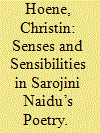| Srl | Item |
| 1 |
ID:
181678


|
|
|
|
|
| Summary/Abstract |
This essay serves as an introduction to a special section on the senses in late colonial India. Participating in the act of decolonising sensory studies, this collection explores the intersections between post-colonial studies and sensory studies by paying particular attention to the sensorium of the colonised. In the historical and geographical context of colonial South Asia, the senses are embedded in acts of distinction across race, caste, class, and bodily and gender hierarchies. The collection intervenes by paying attention to the relationship between power and sense perception as it finds register in media, scientific practices and literature of the period. Across the section, we suggest that making sense of empire is also to make sense of the sensory regimes of empire that have resonances in the contemporary.
|
|
|
|
|
|
|
|
|
|
|
|
|
|
|
|
| 2 |
ID:
181682


|
|
|
|
|
| Summary/Abstract |
The senses play a crucial role in the poetry of Sarojini Naidu (1879–1949), both on the level of theme and on the level of aesthetics. Throughout this essay, I show how Naidu creates multisensorial sensescapes that evoke the Indian aesthetic principle of rasa, which literally translates into English as ‘juice, essence, or taste’ and which, in the context of aesthetic theory, denotes the emotive essence of and response to a piece of art. The early twentieth century saw a revival of classical Indian aesthetics, including rasa. Translating this ancient Indian aesthetic principle into modern poetry in English, Naidu harks back to a pre-colonial cultural idea(l) in order to form a national identity that is independent of the coloniser’s political and cultural imperialism.
|
|
|
|
|
|
|
|
|
|
|
|
|
|
|
|